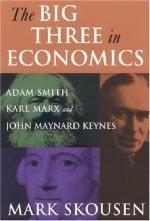|
This section contains 320 words (approx. 2 pages at 300 words per page) |
John Maynard Keynes
When the Great Depression hit the world economists spoke out that the market will balance itself eventually, and that all one could do was wait. Keynes took a revolutionary approach to the matter and spoke to president Franklin Roosevelt; he told the President that the only way to save the economy was to bring the country into debt and thereby use the money to increase the buying power of the people. In turn, production would increase to supply for the rising demand, unemployment would decrease, and investments would come in more readily. It was only when WWII was in full swing though, that F.D.R took Keynes' advice and thus saved the American economy, and thus the world's; even now, 59 years after his death, governments still attempt to follow his teachings (if with something to be desired).
Furthermore, his earlier application of his theory to WWI was pivotal in saving the world leaders from making the same mistakes they had made at the end of the First World War. He argued that they should be helped to redevelop and virtually predicted WWII when he argued that Germany would simply collapse under the reparations and would thus jeopardize Europe. After the Second World War leaders finally took it upon themselves to listen and thus possibly helped prevent another World War.
John Maynard Keynes was a revolutionary thinker and an extraordinary economist and thus admiringly earns his title of being the father of macroeconomics.
|
This section contains 320 words (approx. 2 pages at 300 words per page) |


